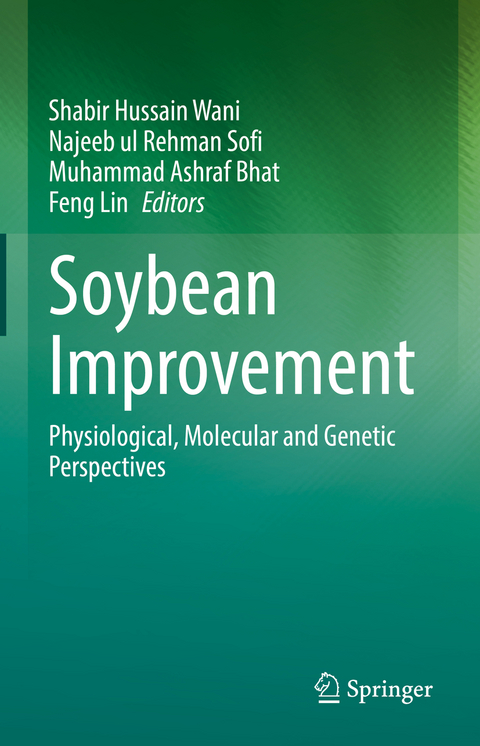
Soybean Improvement
Springer International Publishing (Verlag)
978-3-031-12231-6 (ISBN)
This book includes chapters from renowned potential soybean scientists to discuss the latest updates on soybean molecular and genetic perspectives to elucidate the complex mechanisms to develop biotic and abiotic stress resilience in soybean. Recent studies on the improvement of oil quality and yield in soybean have also been incorporated.
Dr. Shabir Hussain Wani is Assistant professor (Senior Scale) at Mountain Research Centre for Field Crops, Khudwani -192101, Sher-e-Kashmir University of Agricultural Sciences and Technology of Kashmir, J&K, India. He received Ph.D. degree in plant breeding and genetics from the Punjab Agricultural University Ludhiana, India. He teaches courses related to plant breeding, seed science and technology, and stress breeding and has published more than 100 papers/chapters in journals and books of international repute. He has also edited several books on current topics in crop improvement for abiotic stress tolerance published by Springer Nature and CRC press USA. Recently he was selected as Member National Academy of Sciences, India. He also served as visiting Scientist at Department of Plant Soil and Microbial Sciences, Michigan State University, USA under the UGC Raman Post-Doctoral Fellowship programme. Currently, he is leading the Wheat improvement programme at MRCFC Khudwani SKAUST Kashmir. Dr. Najeeb ul Rehman Sofi is Professor cum Chief Scientist and Associate Director Research, Mountain Research Centre for Field Crops, Khudwani, Sher-e-Kashmir University of Agricultural Sciences and Technology of Kashmir, Srinagar J&K, India. He has been instrumental in breeding rice varieties for temperate ecologies of Kashmir region. He teaches courses related to plant breeding, seed science and technology. He has guided many postgraduate students and has attended numerous international and national conferences presenting his work on rice improvement. Currently he is leading the Rice improvement programme at SKUAST Kashmir. Dr. M. Ashraf Bhat is Professor cum Chief Scientist and Head Division of Plant Biotechnology, Sher-e-Kashmir University of Agricultural Sciences and Technology of Kashmir, Srinagar J&K, India. He received Ph.D. degree in Plant breeding and Genetics from the Punjab Agricultural University Ludhiana, India. He teaches courses related to plant breeding, seed science and technology, and Plant biotechnology. He has published more that 80 papers in journals of International and national repute. Recently he released Shalimar Soybean 2 and high yielding variety for release in Jammu and Kashmir State. He has attended many International and national conferences to present his research on improvement of field crops for biotic and abiotic stress tolerance using molecular breeding approaches. Dr Feng Lin is a Post-Doctoral Associate at Department of Plant Soil and Microbial Sciences at Michigan State University, East Lansing USA. He has been working in a field of Soybean molecular breeding for biotic stress tolerance since more than a decade. He has published more than 30 papers in journals of international repute. He has attended many international conferences to present his work on Soybean breeding and genetics.
1. Soybean: A Key player for global food security.- 2. Dissection of Physiological and Biochemical Bases of Drought tolerance in Soybean (Glycine max) Using recent Phenomics approach.- 3. Soybean Improvement for Water-logging Tolerance.- 4. Salinity tolerance in Soybeans: Physiological, molecular and genetic perspectives.- 5. Utility of Network Biology Approaches to Understand the Aluminium Stress Responses in Soybean.- 6. Advances in Molecular markers to develop Soybean cultivars with increased protein and oil content.- 7. Soybean Breeding for Rust Resistance.- 8. Molecular breeding for resistance against pythium root rot (PRR) in soybean.- 9. Molecular Breeding for Resistance against Phytophthora in Soybean.- 10. Mitigation of Soybean Mosaic Virus Using an Efficient Molecular Approach.- 11. Transgenic Approach: A Key to Enrich Soybean Oil Quality.- 12. miRNAs in soybean improvement.- 13. Genome Editing Advances in Soybean Improvement against Biotic and Abiotic stresses.
| Erscheinungsdatum | 19.10.2022 |
|---|---|
| Zusatzinfo | VIII, 276 p. 37 illus., 36 illus. in color. |
| Verlagsort | Cham |
| Sprache | englisch |
| Maße | 155 x 235 mm |
| Gewicht | 583 g |
| Themenwelt | Naturwissenschaften ► Biologie ► Botanik |
| Technik ► Umwelttechnik / Biotechnologie | |
| Weitere Fachgebiete ► Land- / Forstwirtschaft / Fischerei | |
| Schlagworte | abiotic stress • Biotechnology • biotic stress • Crop improvement • Genome editing • genomics • MAS • quantitative traits • Transgenics |
| ISBN-10 | 3-031-12231-3 / 3031122313 |
| ISBN-13 | 978-3-031-12231-6 / 9783031122316 |
| Zustand | Neuware |
| Informationen gemäß Produktsicherheitsverordnung (GPSR) | |
| Haben Sie eine Frage zum Produkt? |
aus dem Bereich


